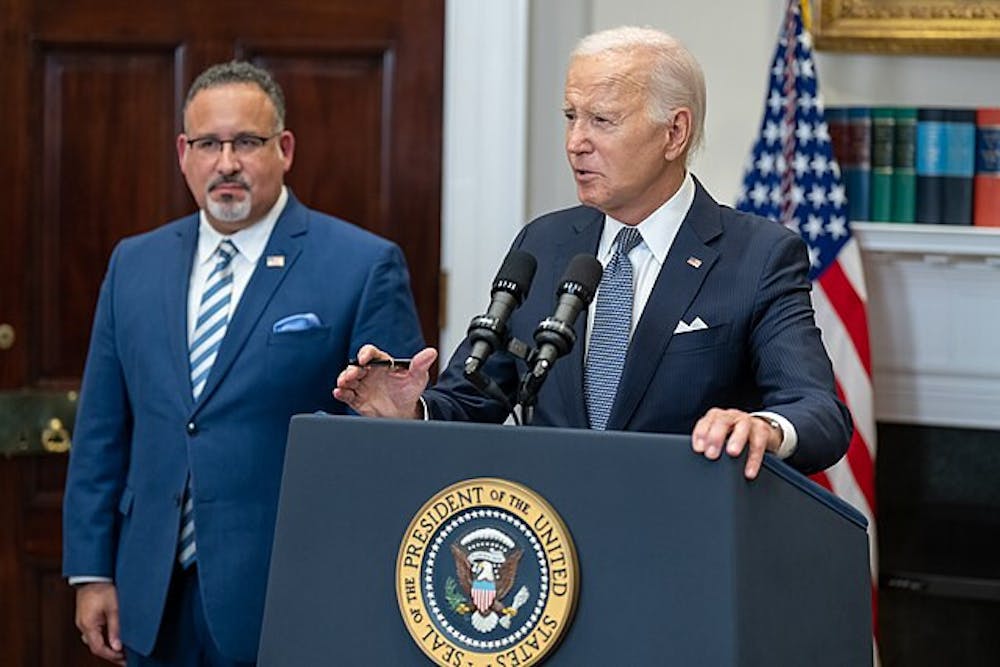A federal appeals court blocked the remainder of the Biden administration’s student debt relief plan Thursday.
The 8th U.S. Circuit Court of Appeals granted a request by several Republican-led states to temporarily halt the Department of Education’s Saving on a Valuable Education (SAVE) Plan, which lowered minimum monthly payments for eligible borrowers and allowed those with principal balances under $12,000 to have their debt forgiven after 10 years.
Secretary of Education Miguel Cardona announced late Thursday night that the department is placing all borrowers currently enrolled in the SAVE Plan in “an interest-free forbearance” — pausing payments without interest continuing to accumulate — as the issue plays out in court.
“Today’s ruling from the 8th Circuit blocking President Biden’s SAVE plan could have devastating consequences for millions of student loan borrowers crushed by unaffordable monthly payments if it remains in effect,” Cardona said in a Friday statement. “It’s shameful that politically motivated lawsuits waged by Republican elected officials are once again standing in the way of lower payments for millions of borrowers.”
SAVE is an income-driven repayment (IDR) plan, meaning monthly payments are calculated based on the borrower’s income and family size. According to the White House, 8 million borrowers had signed up for the SAVE Plan as of Thursday.
Previously, two June 24 decisions by federal judges in Kansas and Missouri blocked the implementation of other loan forgiveness components. But although a June 30 ruling by the 10th U.S. Circuit Court of Appeals then reinstated provisions lowering the minimum payment for certain borrowers, Thursday’s decision formally stymied all remaining efforts to implement the SAVE Plan.
As of August 2022, 30% of Duke undergraduate students took out student loans. For Duke borrowers, the average student debt amount was $24,219 across all loan types and $13,500 specifically for federal loans.
Announced in August 2022, President Joe Biden’s initial student debt relief plan sought to cancel up to $20,000 of federal student loans for qualifying borrowers.
The plan was struck down in a 6-3 ruling by the Supreme Court in June 2023, which asserted the Education Department had exceeded its authority to modify regulations. Chief Justice John Roberts wrote in the majority opinion that Cardona was allowed to make “modest adjustments and additions to existing provisions, not transform them.”
In response, the Biden administration implemented a number of additional programs aimed at providing student debt relief.
In July 2023, the Education Department announced it would cancel $39 billion in federal student loans for 804,000 borrowers who had already made 20 or 25 years of monthly payments under an existing IDR plan.
The Biden administration also launched the beta application for its SAVE Plan last summer. The move came months in advance of the October 2023 expiration of the Education Department’s loan suspension plan, which was originally created as a COVID-19 relief measure.
Before the temporary halt, the Department of Education had already forgiven $5.5 billion in student debt for 414,000 borrowers. In February, the Education Department reported that $33.3 million in student debt had been canceled for 4,170 North Carolinian borrowers.
Earlier on Thursday, the Biden administration announced $1.2 billion in student debt relief for 35,000 public service workers under the Public Service Loan Forgiveness Program, which was originally passed in 2007.
Current Duke students can review their financial aid history in DukeHub or visit the Karsh Office of Undergraduate Financial Support website for more information. Alumni can visit the Federal Student Aid website or contact their loan servicer directly for information on how much they owe.
Editor’s note: This article was updated Friday with Cardona’s statement and the Education Department’s plan to pause current payments while legal action continues.
Get The Chronicle straight to your inbox
Sign up for our weekly newsletter. Cancel at any time.

Zoe Kolenovsky is a Trinity junior and news editor of The Chronicle's 120th volume.

